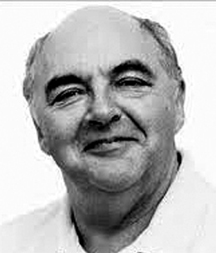Asks Donald Duff
It seems everyone but West Indies Cricket Board (WICB) CEO, Dr Ernest Hilaire, knows what is wrong with the present state of West Indies cricket.
Certainly the English media knows.
Shortly after the team’s arrival in England for the three-test tour, the English media went to town on the team selected, raising pertinent questions about the reason for the decline of the once great team and of the subsequent future of the game in the region.

Noted cricket writer, Scyld Berry, writing in the Daily Telegraph, said the decline of the game in the Caribbean was “sad.”
He pointed out that the Windies (and I use that world loosely) in the last 30 test matches, have won a mere two, with one of the victories being against lowly-rated Bangladesh.
He was critical of the domestic structure of the region (which he feels contributed to the decline) spoke of the incompetence of the WICB (which he said resulted in “waifs and strays” being thrown into deep end) and said skipper Darren Sammy was not worth his place in the team (suggesting that Andre Russell would be a better bet).
Lawrence Booth, writing in the Daily Mail, was equally as harsh stating that the present team was only “purporting” to represent the West Indies.
He pointed out that since 2000, the West Indies no longer commanded five-test tours but have to be satisfied with three test matches and stated that the present team could have been much stronger if those players that opted to play in this year’s IPL were selected.
Booth placed their non-selection squarely at the feet of the WICB stating that if the WICB ‘gets its house in order’, it can field a competitive team.
But it was Steven Brenkley, writing in the Independent, who, in one paragraph encapsulated the past, present and future of West Indies cricket.
Brenkley wrote:”Cricket in the Caribbean, once so joyous and victorious, is in an unholy mess. It is not simply that the teams are losing too often but that the game is being so woefully run that there is a serious danger of the world passing it by.”
Enter WICB’s CEO Dr. Ernest Hilaire.
In statements that seemed unambiguously in defence of the current team’s recent performance and its criticism by the English press, not to mention its selection, Dr. Hilaire told the audience at the Barbados Cricket Association awards ceremony that the time had come for the regional selectors to focus on picking its “best 11” as opposed to the “11 best” players available, clearly an attempt to justify why the likes of Chris Gayle (Test matches), Dwayne Bravo, Sunil Narine, Andre Russell, Dwayne Smith, Ramnaresh Sarwan and Brendan Nash were not selected.
“For a decade or so the selectors were guided by a process which had them arriving at the 11 best players to take the field,” Dr. Hilaire said.
“With the 11 best players on the park our results went from bad to worse and yet worst still.”

Dr. Hilaire is making no bones about this. He is laying the blame for the precipitous decline, which saw the West Indies team going from being number one in the world to currently number seven, (only ahead of New Zealand and Bangladesh) squarely at the feet of the players. For Dr. Hilaire, it’s not thestandard of cricket in the region; the ineptness of the WICB (Visa problems et al), its selectors and their policies. No! The fault, dear Brutus, lies with the players.
“There has been a paradigm shift. The emphasis is on selecting, not necessarily the 11 best players but the ‘best 11’. It is not dissimilar to asking whether we prefer a team of stars or a star team. They are decidedly different,” said Hilaire.
“Though the victories have not been tumbling in, there can be little doubt that West Indies cricket is showing the signs of learning the first characteristic of any successful enterprise – the determination to succeed,” he added.
“We have seen a greater commitment to fight to the very end; we have seen what was once thumping three and four-day defeats in Test cricket now turned into epic final day battles.
“This new approach is not far off from producing the results we all yearn for. “Change does not happen overnight. It is a process, sometimes painful, always with mistakes and mis-steps but once on the right path the results are certain.
“I implore you to recognize that from the days when our team seemed conditioned to losing we now have a team which is battling to win and believing that it can in fact achieve victories.”
Really!
Dr Hilaire seems to know his cricket. He knows how many players are bamboozled by spin and is using the weapon effectively.
The above statements are nothing but superb public relations on the part of the WICB CEO.
Dr. Hilaire is bowling a googly to the West Indian public. He is suggesting that the “waifs and strays” will finally get it right; that 11 players playing as a team can produce better results than a team of star players who are not.
It is not an invalid point but there is absolutely no guarantee that in the long run, Dr Hilaire’s and the selectors’ views on commitment, unity and such like will lead to a reversal of the team’s fortunes.
Not by a long chalk.

Players who are more commited, more loyal, do not necessarily perform better than those who are better skilled and more talented. It is not as cut and dried as that although there might be a few occasions when it appears that way.
Dr. Hilaire’s theory about star players is questionable for, in a number of team sports, it is the star players who make the difference, those players with the talent, skill and desire to win sometimes at all costs just look at the IPL where Gayle is a prime example.
Dr. Hilaire seems to have a bee in his bonnet with respect to star players such as Shivnarine Chanderpaul and Gayle.
It was not so long ago that Chanderpual was forced to respond to statements allegedly made by Dr. Hilaire about him.
According to Chanderpaul, Dr Hilaire’s comments……”conveyed the impression to right-minded persons that I was among the cricketers you considered ill-disciplined, that I did not apply myself to my job, that I thought I was a superstar.”
Rings a bell.
Chanderpaul was also upset that it seemed as if Dr. Hilaire was not altogether enamoured with his performance over the years and wrote:”…you generally belittled and dismissed my significant contributions to West Indies cricket over the past 15 years.”
When it is taken into account that the West Indies selectors had asked that Chanderpaul retire and that Chanderpaul continues to save the West Indies team’s blushes with the bat which has resulted in him becoming the world’s number one test batsman for the second time in his illustrious career, one gets the feeling that those who think that the WICB is out to make certain players scapegoats for the senior team’s poor showing, might not be altogether wrong.
Putting all that aside though, the challenge to Dr. Hilaire is to leave the public relations to someone capable like WICB Corporate Communications Officer, Imran Khan, and focus on matters that are more in his domain.
For starters, the WICB CEO should tell the public what is being done to improve the standard of the regional cricket competition.
This year’s tournament was a disaster with low scores and many matches finishing inside of two days. Add substandard pitches and the fact that the tournament does not have a sponsor and you probably have the main reason for the deterioration in the senior team’s performances at the test level.
As the governing body for cricket in the region the WICB has shown itself utterly unable to deal with situations which arise.
One is speaking here of the Guyana Cricket Board impasse.
The WICB needs to address this situation urgently. It should re-commence negotiations with the Guyana Government to try and arrive at a workable solution to restore fully the operations of the various area boards and to ensure fresh elections so as to enable a democratically elected GCB to function.
It should also update the public of the present status of its Collective Bargaining Agreement with WIPA and strive to have a better working relationship with the WIPA thereby resisting the temptation to continue losing all of the court cases to WIPA.
The WICB should also strive to have more coaching done at the grassroots level; to popularize the game thereby increasing crowd support and revenue, and finally, make more use of the former test players as it strives to have its representative teams climb the ICC rankings.
Making excuses for the state of cricket in the region is not the answer. Dr Hilaire should not need any journalist, English or otherwise to tell him that.









